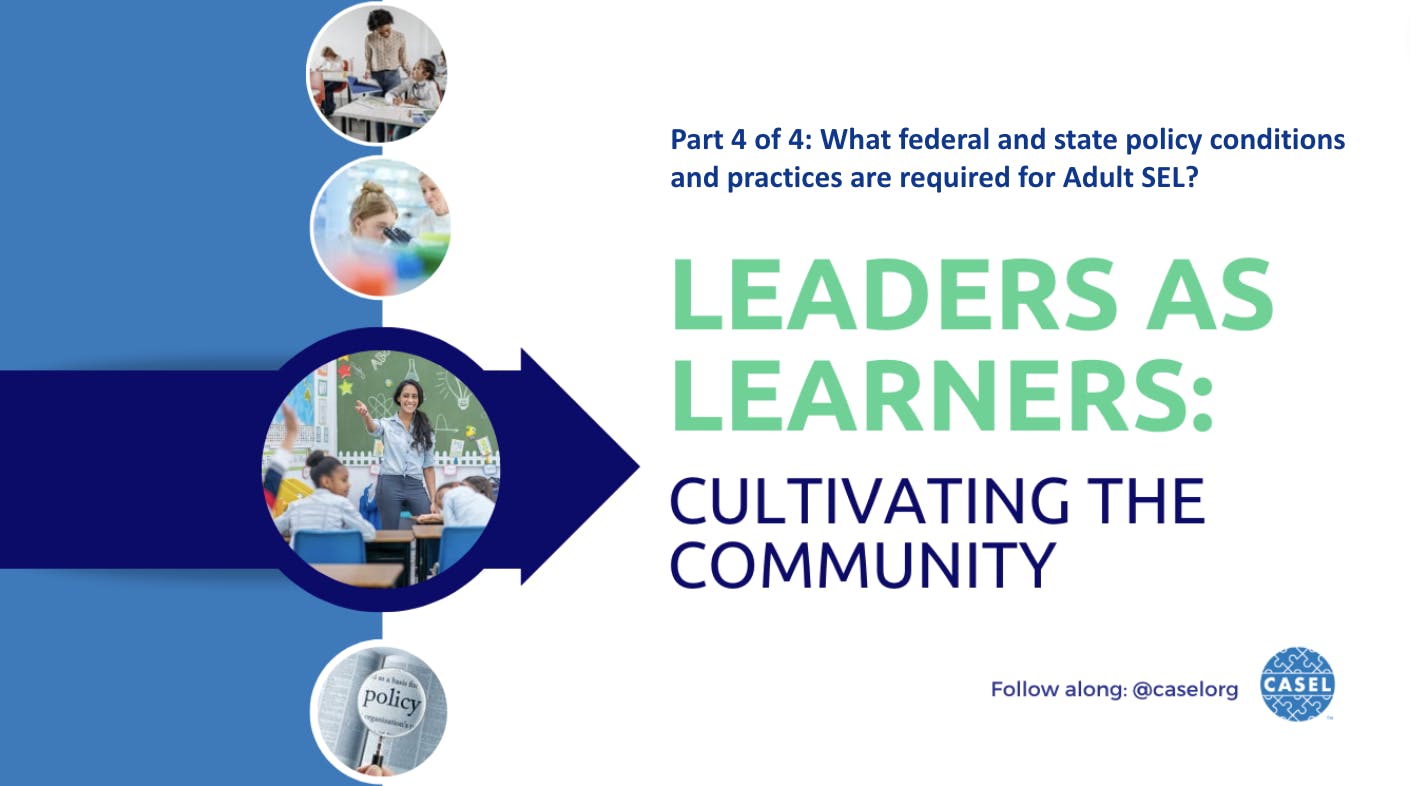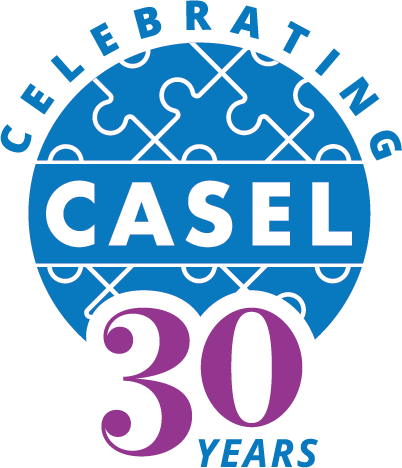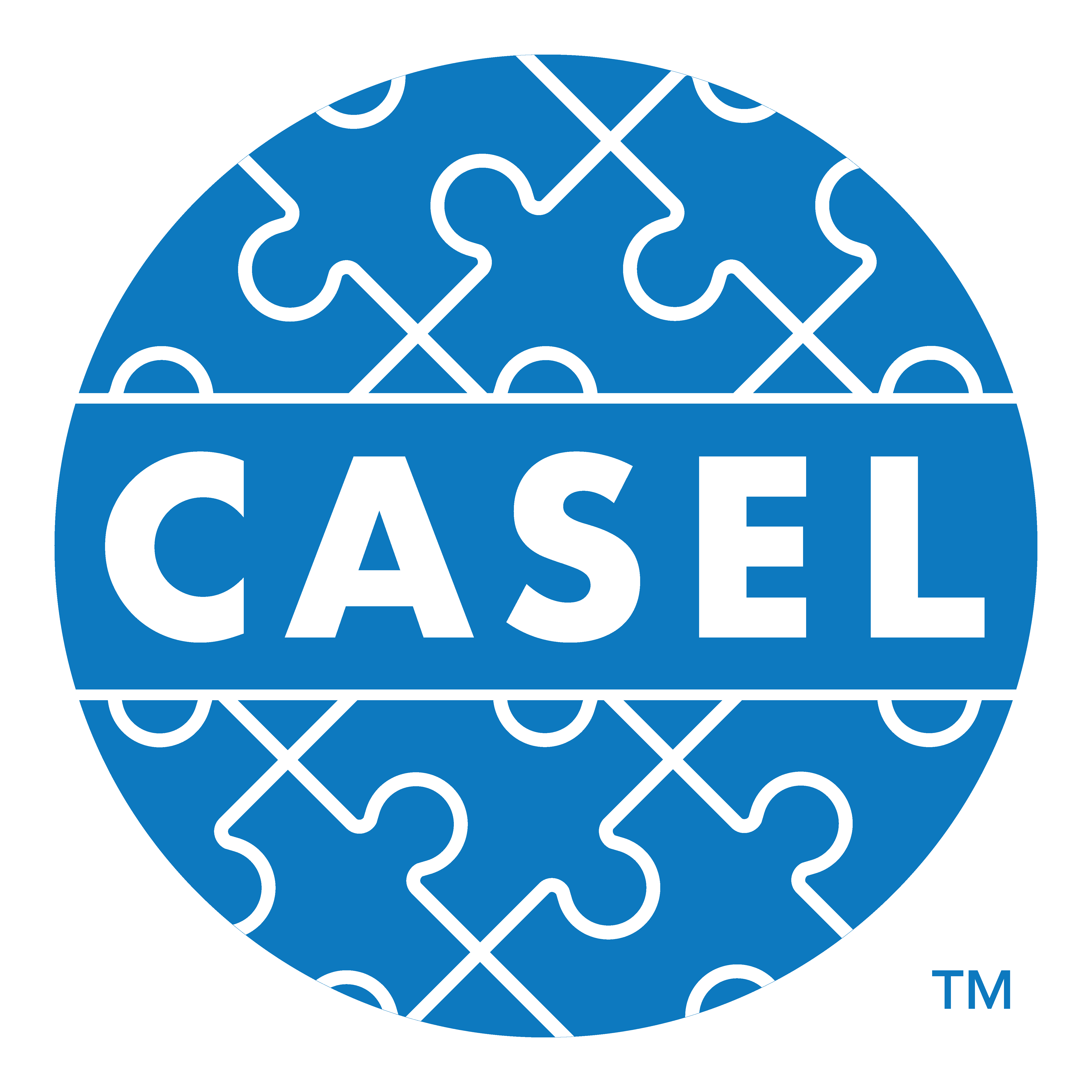
Our webinar series Leaders as Learners: Cultivating Adult SEL has explored what adult SEL is, what the research says, and practices for effectively supporting adult SEL. To wrap up the series, we asked:
What policy conditions are necessary for adult SEL?
We expect our teachers to be able to teach [SEL] skills, but if we aren’t supporting the educators in living out the skills themselves and becoming aware of what they are and how they develop them, then we’re not doing our job in supporting our educators, so they can’t do their job in supporting their students.
Michelle Trujillo, Nevada Department of Education
In Part 4 of our four-part webinar series, Andy Tucker, Director of Policy at CASEL, was joined by a panel of experts to discuss policies that support adult SEL.
- Melissa Bellin, Senior Policy Advisor, Learning Policy Institute
- Michelle Trujillo, School Culture and Climate Specialist, Nevada Department of Education
- Sabrina Winkleman, Social and Emotional Learning Specialist, Minnesota Department of Education
Read on for key takeaways from the conversation.
What is the federal role in supporting the preparedness of teachers entering the classroom in SEL?
“Currently there are three primary federal vehicles to support comprehensive preparation for teachers: the Quality Partnership Program, under Title II of the Higher Education Act; the Augustus F. Hawkins Centers of Excellence Program; and a Personnel Preparation Program, under Part D of the Individuals with Disabilities Education Act.
“Likewise, professional development is very important for school leaders. The federal government provides funding for educator training and development under Title II, Part A of the Elementary and Secondary Education Act through the Supporting Effective Instruction Program, and this program permits states to set aside 3 percent of their funding to strengthen the quality of school leaders, including through principal development.
“These federal investments in comprehensive educator preparation, as well as professional learning, not only provide teachers and principals with the tools to support the academic, social, and emotional development of students, but also create the types of environments that support the social and emotional health and wellness of teachers and school leaders.”
-Bellin
What state policies and efforts support adult social and emotional learning?
“The Learning Policy Institute [started] a teacher collaborative focused on whole child efforts within teacher prep standards. [The Minnesota Department of Education] applied and was accepted, and we’re thrilled to partner with them on completely revamping our teacher prep program.
“We did really intensive work in thinking about the most potent adult SEL competencies aligned with effective practice. We started framing out a toolkit in anticipation of the standards becoming statute…. I’m happy to report that earlier this spring they did pass; they were adopted. So now we have that toolkit in progress, and I’m doing workshops to bridge those new standards and the adult SEL competencies with the tools we have right now.”
-Winkleman
“In Nevada, we’ve been very intentional for educators with [virtual SEL lessons] and with the workshops and trainings we do in person to try to meet the needs of educators right where they are. We know that educators right now are feeling quite overwhelmed. They don’t necessarily need more to do…. So when we look at adult SEL, we try to identify behaviors that are inherent to our educators’ daily routines. What are behaviors that they can look at, like being reflective, being intentional, being connected, all of these things that are aligned with the CASEL competencies? We ask our educators to look at the strengths they already have, what’s natural for them within these ways of being, and the areas where there’s potential for growth.
“So we have our educators look at themselves individually, but we also have some work that we do with educators that helps them look at themselves as a collective body…. We also have an entire unit on evidence-based SEL interventions, as well as using data to sustain SEL implementation. So it’s not just about acknowledging and bringing SEL into our schools, but also about how we sustain it as a process and as a way of being.”
-Trujillo
How has SEL helped you to do your job better, particularly in the classroom and in schools?
“I spent over 25 years in the classroom … and we were living out SEL before we ever used it by name. … We based everything we did on making connections, leading with love, things that sometimes we’re afraid of talking about in school, but it was just our way of being as a school. That real, in-the-trenches experience is something that resonates with people.”
-Trujillo
“The experience of honoring full children, whole communities, and whole educators and having a culturally responsive lens to experience that as a teacher, administrator, and coach deeply informs what I bring to the state level. Particularly as a classroom teacher, [I saw] that learning environments that are equitable, joyful, and encourage children to bring their full selves are the ones where children thrive. We must have and create the practices, policies, and procedures to support that.”
-Winkleman
“Similarly, my time as an elementary school teacher really highlighted for me the important role social and emotional development plays in students’ academic success and their overall well-being. And now, in past and current roles in the policy space, I understand this is supported by such a wide body of research. I think policy can be such an effective lever to ensure that our education system is really grounded in the research, in the science of how students learn and develop.”
-Bellin
Resources
- Whole Child Policy Toolkit: Building Adult Capacity and Expertise
- Diversifying the Teaching Profession: How to Recruit and Retain Teachers of Color
- Developing Effective Principals
- Evidence for Social-Emotional Learning in Schools
- Educator Learning to Enact the Science of Learning and Development
If you missed them, catch up on recaps for Part 1, Part 2, and Part 3 of this webinar, where we explored what adult SEL is, what the research says, and quality practices for implementing adult SEL.
For a deeper dive into how adult SEL supports student success, register for the 2023 SEL Exchange: Leaders as Learners: Building the Village Our Children Need, July 7-9 in Atlanta, Georgia. You’ll connect in person with education leaders from around the world to explore the critical role of adult SEL through more than 150 sessions covering important topics including school safety, student voice, and education and AI.

